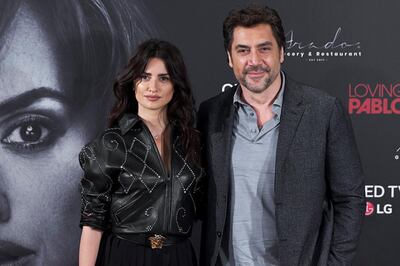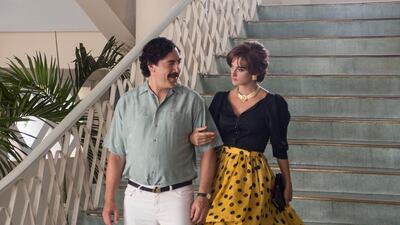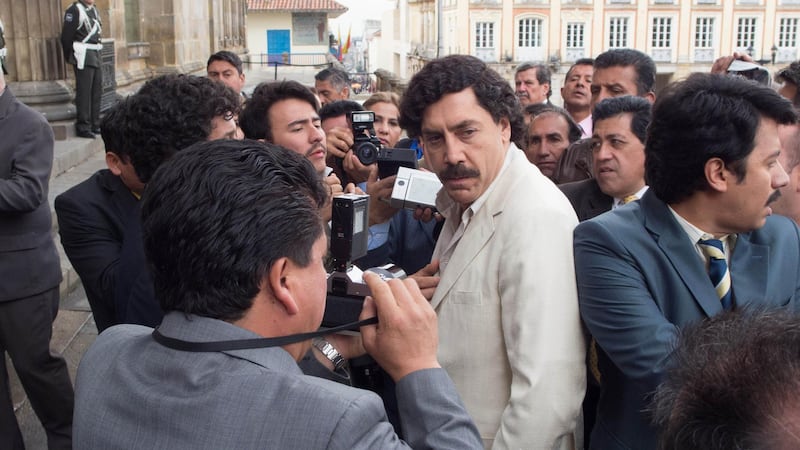It's no surprise that the story of Pablo Escobar has lured so many filmmakers and actors. The drug lord ran the feared Medellin cartel that, at its height, smuggled an estimated eighty per cent of all the cocaine travelling across American borders. To some in his native Colombia, Escobar was revered as a latter-day folk hero; to others, he was a scourge on society.
In recent years he has been portrayed in the popular Netflix show Narcos, which cast Wagner Moura in the role. Another television series, the Spanish language Pablo Escobar, The Drug Lord catalogued his life in 113 episodes. On film, he has appeared in everything from the 2017 Tom Cruise movie American Made to Paradise Lost, in which he was played by the Oscar winner Benicio del Toro.
The appeal of playing Pablo
Now it's the turn of another Academy Award winner, Javier Bardem, who takes on the role in Loving Pablo. As early as 1998, the Spanish star recalls being offered the chance to play Escobar. He refused, but it triggered his interest in the real man. "Since then, they offered me many other Pablos. I was interested in the link between a human being and a monster. Most of the times, if not all the times, they called me to play just the monster."
Click below to watch the Loving Pablo trailer:
It was around the time of one of these offers that Bardem was working with Spanish director Fernando Leon de Aranoa on 2002's Mondays In The Sun. Like Bardem, the filmmaker became intrigued by Escobar. "I got hooked on the real story," he says. But it wasn't until five years ago that he and Bardem decided to get together again and work on their own Escobar film. The filmmaker read 17 accounts of the man's life in preparation.
In the end, it was the best-selling 2007 memoir Loving Pablo, Hating Escobar by former Colombian TV journalist Virginia Vallejo that provided a way into an epic real-life story for the screen. "They were lovers for several years and this gave her very close access to his decisions and especially his mind," says Leon de Aranoa. Moreover, they had the perfect actress to play Vallejo, Bardem's off-screen wife Penelope Cruz.
"Virginia was the one who taught him how to speak to the press," says Cruz, who appeared with Bardem in 1992's romantic-comedy Jamon Jamon and then Woody Allen's Vicky Cristina Barcelona, which won her an Oscar. "She was a very respected journalist in Colombia. She ended up losing everything, her reputation, her home and her friends. She was receiving death threats."

Cruz says that Vallejo did not know what she was getting into when she began an affair with the married Escobar. Does she believe this? “Maybe she looked the other way. She says in the book, ‘I don’t care how he made his money, only how he uses it.’ So you know something is wrong. At the beginning, there was an attraction to that darkness. She went in fully and when she wanted to get out … it affected her entire life.”
Leon de Aranoa felt that Vallejo would make the perfect narrator for Escobar’s story. “She could be very close to understanding things, but also to put some distance between them, and tell about Pablo and his decisions, with irony, which is what happens in the film. I also like her because she’s a strong character, she’s not like the lady who falls in love with the wrong guy. She’s as tough as he is.”
Transforming into character
The film spans a dozen years, beginning in 1981 “when he was at the top of his game as a drug trafficker”, as the director puts it. “He was already a millionaire and he wanted to get this respect and admiration, so he made a decision of running for congress and became a politician. Most of it is about trying to get some respect and he tried to get it through economic power.”
With so many other Escobar projects in the works, the director claims they largely avoided looking at what others were doing. “We didn’t want to be influenced. We had different aims. That’s why we didn’t even watch them. So we didn’t want to have any influence: not in favour, not against our project. That was a common decision we made with Penelope and Javier and we kept going as planned.”

The only Escobar film Bardem watched was Paradise Lost because he's friends with its director, Andrea Di Stefano. He admits he'd heard some Escobar projects amp up the violence. "It's horrible," he says. "One thing for sure we wanted to address is if you support that life, if you aim to be like these people or support these people, you're going to end up in a very bad situation. There is nothing glamorous about it. There is nothing fun about it."
Bardem gained weight to play his character but with the pressure of an eight-week shoot, he wasn't able to show the fluctuations in Escobar's body over 12 years. It meant make-up, prosthetics and lighting "to help the transition", although according to Cruz, this was just part of the performance. "I saw the whole transformation – and I'm not talking about the look. Everything. I forgot that I was watching Javier."
_______________________
Read more:
Real life story behind Narcos comes to Dubai
Andrea Di Stefano on getting into the mind of gangster Pablo Escobar
Pope pays tribute to victims of Colombian drug trade
_______________________
While the decision was made to shoot in English – with Bardem and Cruz adopting Colombian accents – the production was filmed in Colombia, in the locations where events took place. For Bardem, it was his second time in the country after making Love in the Time of Cholera. "It would've been so different to do it somewhere else," says Cruz. "It was very good for us to be there and understand more things about Colombia."
Quite whether the film will help rescue Colombia’s tarnished reputation is hard to say. It left Bardem pondering just why a man like Escobar could rise as he did. “It’s about people being easily corrupted. Unfortunately, that’s a matter of everyday life,” he says. “Pablo Escobar was a very important figure in that sense because, as the movie tells, everybody was involved in [his] ascent, including the government.” It’s a stark reminder of what corruption can unleash.
Loving Pablo opens in UAE cinemas on June 14





